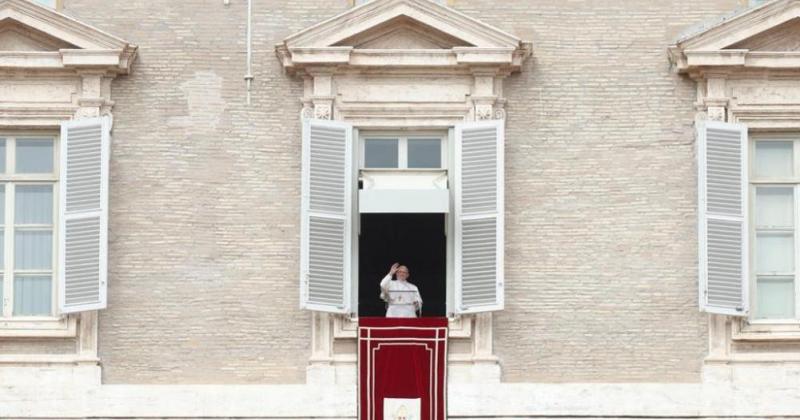Angelus: Francis' heartfelt appeal for Eastern Goutha, “You cannot fight evil with another evil, let there be access to humanitarian aid and let the wounded and sick be evacuated"
GIACOMO GALEAZZI
VATICAN CITY
"In these days my thoughts are often addressed to the beloved and tormented Syria, where the war has intensified, especially in Eastern Ghouta - the Pope said at Angelus - This February was one of the most violent in seven years of conflict: hundreds, thousands of civilian victims, children, women, elderly people; hospitals have been hit; people cannot get food. All this is inhumane. You can't fight evil with other evil. I therefore make a heartfelt appeal for the immediate cessation of the violence, to grant access to humanitarian aid such as food and medicine and that the wounded and sick be evacuated”. “We pray to God, he said, that this happens without delay.”
In recent days, the Holy See, through the Secretary of State Pietro Parolin, intervened at the United Nations to ask for a resolution that may pave the way for "an end to violence, access to humanitarian aid and finally a negotiated solution", also referring to the Pope's "great concern" for the "dramatic and disastrous situation, especially in eastern Ghouta and other regions such as Afrin".
Before reciting the Marian Prayer with the faithful gathered in St. Peter's Square, Francis invites to "be more attentive to the voice of God and to allow oneself to be enveloped and transformed by the Spirit”, he then reflected on the readings proposed by the Sunday liturgy and stressed that today's Gospel invites us to contemplate the transfiguration of Jesus.
This episode, according to the Pontiff, “is related to what had happened six days earlier, when Jesus revealed to his disciples that in Jerusalem he would have to "suffer a lot and be rejected by the elders, the chief priests and the scribes, be killed and, after three days, rise again". This announcement, Jorge Mario Bergoglio continued, had challenged Peter and the whole group of disciples, who rejected the idea that Jesus was to be rejected by the leaders of the people and killed. They were awaiting a powerful and dominant Messiah, but Jesus presents himself as a humble and gentle servant of God and of mankind, who will have to sacrifice his life, passing through the path of persecution, suffering and death - Francis asked - How can we follow a Master and Messiah whose earthly life would end in that way? The answer comes precisely from the transfiguration: an early Easter apparition".
Jesus took with him the three disciples Peter, James and John and "led them on a high mountain" and there, for a moment, he showed them his glory, the glory of the Son of God”. “The transfiguration thus allows the disciples to face Jesus' passion in a positive way, without being overwhelmed - the Pope points out - The transfiguration helps the disciples, and us too, to understand that the passion of Christ is a mystery of suffering, but it is above all a gift of infinite love on the part of Jesus. The event of Jesus transfiguring on the mountain makes us understand his resurrection better".
“If before the passion there had not been the transfiguration with the declaration from God: "This is my beloved Son" the resurrection and the paschal mystery of Jesus would not have been easily as understood in all their depth.”
“To understand them it is necessary to know in advance that he who suffers and who is glorified is not only a man, but is the Son of God, who saved us with his love faithful to the point of death - the Pontiff said - the Father thus renews his messianic declaration on the Son, already made on the banks of the Jordan river on the day of baptism, and exhorts, "Listen to him! The disciples are called to follow the Master with trust and hope, despite his death”.
"The divinity of Jesus, adds Jorge Mario Bergoglio, must manifest itself on the cross, precisely in him dying "in that way", so much that the evangelist Mark places on the mouth of the centurion the profession of faith, "Truly this man was the Son of God". The revelation of Jesus’s divinity "happened on the mountain, which in the Bible is an emblematic place where God shows himself to us".
Therefore "it is necessary, especially during Lent, to climb with Jesus on the mountain and stay with Him, to be more attentive to the voice of God and to allow oneself to be enveloped and transformed by the Spirit". According to Francis, "We must live the experience of contemplation and prayer, not to escape from the harshness of daily life, but to enjoy familiarity with God, so that we can then go back with renewed vigour onto the tiring journey of the cross, which leads to resurrection". And "We shall now pray to the Virgin Mary, the human creature transfigured inwardly by the grace of Christ. We trust her maternal help to continue with faith and generosity the journey of Lent ".
After the Angelus, the Pope addresses his usual greetings to "all of you pilgrims from Rome, Italy and various countries, especially those who have come from Spis, Slovakia". In particular, he greets "the representatives of the diocesan television station of Prato with their bishop, the young people of the orchestra of Oppido Mamertina, the scouts of Genoa, the young people coming from Serravalle Scrivia, Verdellino, Zingonia, Lodi, Renate and Verduggio".
He also addresses a thought to the group that came for the “Rare Disease Day", with an encouragement to the associations that work in this field. To everyone he wishes "a good Sunday: don't forget to pray for me. Enjoy your lunch and goodbye!".
